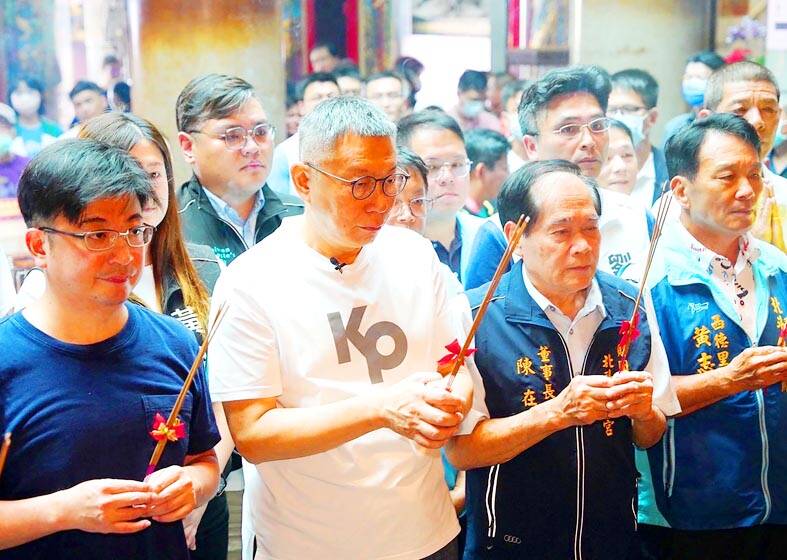Keelung Councilor Jiho Chang (張之豪), a member of Democratic Progressive Party (DPP), yesterday shared an online post criticizing Taiwan People’s Party (TPP) Chairman and presidential candidate Ko Wen-je (柯文哲) for the titles of his two books, following the party’s recent withdrawal of its slogan due to the resemblance to white supremacist discourse.
Ko has published two books, expounding his ideas to forge a new third political force in Taiwan, calling it “colorless,” or as a “white-color party,” and named them The White Power and The White Power II in English.
Chang yesterday posted a message on social media saying Ko had written a book in 2014 that is on sale at online foreign platforms with the title The White Power, then followed up with a second book later that year, titled The White Power II.

Photo: CNA
The titles can be interpreted as an endorsement of white supremacy, Chang said.
The TPP had to withdraw its slogan “Vote White, Vote Right,” due to the backlash from domestic media and Taiwan-based foreign journalists.
Chang who previously lived in Canada and graduated from the University of British Columbia, wrote: “I am sure that Ko Wen-je is not a white supremacist. But it is clear Ko is totally devoid of international perspective.”
Ko ran as an independent candidate to win the local elections in 2014 and started serving the first of his two terms as Taipei City mayor that year. His books were published during the campaign to present Ko, his background and political philosophy to voters and they were named “power, or strength of the white-color (force) (白色的力量) in Chinese.
The two books are still available online on international platforms such as Amazon, eBay and Wob with the title The White Power, Chang said.
The TPP last week had to remove its slogan “Vote White, Vote Right” from its Web site following criticism about its resemblance to the language used by white supremacists.
Taiwan-based American journalist Erin Hale said the TPP slogan is the same as the National States’ Rights Party, a now-defunct US white supremacist political group active from the 1960s to the 1970s.
TPP spokeswoman Lin Tzu-yu (林子宇) said the slogan referred to the color white that the TPP brands itself with.
“It was supposed to mean that a vote for the ‘power of white’ is the right choice,” Lin said as she denied any links to white supremacy.
The TPP pulled back the slogan, due to drawing “different opinions” online and from “friends from the West,” Lin said, while other party officials pointed at the administrators running the Web site as the source of the problem.
The TPP cannot blame the book titles on the administrators, since the books, which were written and named by Ko, came out in 2014, Chang wrote.
Meanwhile, a social media user wrote: “Thanks to Ko’s party, Taiwan is a laughingstock abroad, for promoting racism and white superiority.”
Some online users said the TPP needs to improve its handling of foreign affairs.

An essay competition jointly organized by a local writing society and a publisher affiliated with the Chinese Communist Party (CCP) might have contravened the Act Governing Relations Between the People of the Taiwan Area and the Mainland Area (臺灣地區與大陸地區人民關係條例), the Mainland Affairs Council (MAC) said on Thursday. “In this case, the partner organization is clearly an agency under the CCP’s Fujian Provincial Committee,” MAC Deputy Minister and spokesperson Liang Wen-chieh (梁文傑) said at a news briefing in Taipei. “It also involves bringing Taiwanese students to China with all-expenses-paid arrangements to attend award ceremonies and camps,” Liang said. Those two “characteristics” are typically sufficient

A magnitude 5.9 earthquake that struck about 33km off the coast of Hualien City was the "main shock" in a series of quakes in the area, with aftershocks expected over the next three days, the Central Weather Administration (CWA) said yesterday. Prior to the magnitude 5.9 quake shaking most of Taiwan at 6:53pm yesterday, six other earthquakes stronger than a magnitude of 4, starting with a magnitude 5.5 quake at 6:09pm, occurred in the area. CWA Seismological Center Director Wu Chien-fu (吳健富) confirmed that the quakes were all part of the same series and that the magnitude 5.5 temblor was

The brilliant blue waters, thick foliage and bucolic atmosphere on this seemingly idyllic archipelago deep in the Pacific Ocean belie the key role it now plays in a titanic geopolitical struggle. Palau is again on the front line as China, and the US and its allies prepare their forces in an intensifying contest for control over the Asia-Pacific region. The democratic nation of just 17,000 people hosts US-controlled airstrips and soon-to-be-completed radar installations that the US military describes as “critical” to monitoring vast swathes of water and airspace. It is also a key piece of the second island chain, a string of

The Central Weather Administration has issued a heat alert for southeastern Taiwan, warning of temperatures as high as 36°C today, while alerting some coastal areas of strong winds later in the day. Kaohsiung’s Neimen District (內門) and Pingtung County’s Neipu Township (內埔) are under an orange heat alert, which warns of temperatures as high as 36°C for three consecutive days, the CWA said, citing southwest winds. The heat would also extend to Tainan’s Nansi (楠西) and Yujing (玉井) districts, as well as Pingtung’s Gaoshu (高樹), Yanpu (鹽埔) and Majia (瑪家) townships, it said, forecasting highs of up to 36°C in those areas